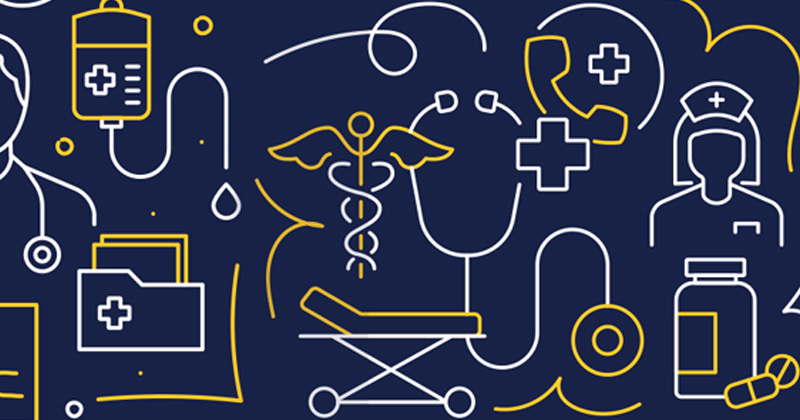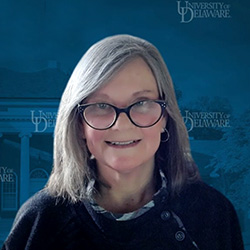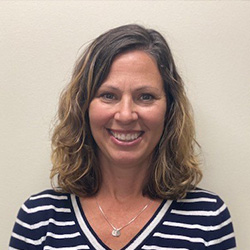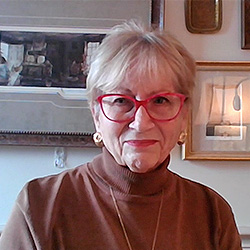


Answering the call -- again
Illustration by Jeffrey C. Chase February 24, 2022
UD’s RN Refresher gives returning nurses tools for new challenges
Long before the crush of the COVID-19 pandemic, hospitals had a pre-existing condition. They were chronically short-staffed.
Now, after waves of COVID patients, surges of viral variants and the departure of thousands of nurses from the front lines, some healthcare facilities have found themselves in a critical condition, with too few nurses to meet the ongoing demand for care.
Some have had to divert patients, postpone elective surgeries, even close their doors. In September, the American Nurses Association called on federal officials to declare the nursing shortage a national crisis and do more to help recruit and retain skilled nurses.
It’s a supply-chain problem of extreme consequence with no quick fix. But unlike shortages of toilet paper, plywood or personal protective equipment, no government official or chief executive officer can order up an emergency shipment of skilled, experienced nurses to care for critically ill patients.
The good news is there are thousands of former nurses who have answered that call-to-duty bell before and many want to do it again.
The University of Delaware’s online RN Refresher Program is made for them. It gives experienced nurses who have been on hiatus the opportunity to refresh their knowledge and skills, learn the (new) ropes and re-enter practice.
It’s not for beginners or new hires or those who want to pursue higher degrees. UD’s College of Health Sciences has an outstanding School of Nursing for everyone from those just entering the field to those pursuing a doctorate.
This program, offered through Professional and Continuing Studies, is for returners — those who left the field to raise a family, care for a loved one, serve with the military or pursue other opportunities and now realize they want to come back.

“Many are nurses who want to return to practice but their licenses have lapsed or others with active licenses who want to transition back into direct patient care, having practiced in nontraditional nursing settings,” said UD’s Diane Beatty, coordinator of UD’s program. “But they miss it. It’s in their hearts.”
Beatty knows that feeling. She was in the third cohort of the program in 2005, when she returned to nursing after raising her three children.
Kate Salvato, a UD alum, was director of education at Bayhealth Medical Center in southern Delaware when UD Professor Madeline Lambrecht asked her to help develop the RN refresher. At the time, Lambrecht was director of the College of Health Sciences’ Division of Special Programs. She is now professor emeritus, and Salvato is director of the program.
As they considered what to include in the program, they talked to officials in education, public health, community health and nursing boards to learn what should be covered and what was needed most.
“The fact that was important to them was that these were returning nurses,” Salvato said. “They already had experience. They have been through the initiation and the trial by fire. They had everything else, we were just refreshing their skills.”
Almost 1,500 nurses have enrolled in UD’s program, Beatty said, including students from around the country and around the world.
Betsey Pierce of Phoenix, Maryland, is among them. She graduated from nursing school in 1992 and worked as a nurse for about nine years, with stops in pediatrics, a medical/surgical unit at Johns Hopkins in Baltimore, a rural hospital in Zimbabwe, a “float pool” (filling in as needed) at a local hospital, hospice, a boarding school in Kenya and managing workmen’s compensation cases.
She stepped away from nursing when she and her husband started their family. As her kids neared college age, she started thinking about returning to work.

"What I love about nursing is that there are many different opportunities, and so much flexibility in choosing a work schedule,” she said. “I have enjoyed trying several different types of nursing, which have given me many diverse and interesting life experiences. I have also truly enjoyed nursing because the work is about caring for people, which makes the work so fulfilling."
A few years ago, a friend told her she had taken the University of Delaware’s RN Refresher course and recommended she consider it.
Pierce completed the program last August and now works as director of education for Avila Home Care in Towson, Maryland.
“I loved the program,” she said. “I feel like they did an excellent job with every aspect.”
She was glad to refresh her skills and also to be able to think through some of the issues and challenges that nurses face today.
With online, self-paced learning that allows students to take classes at any time of the day or night, UD’s program accommodates students’ unique situations.
The program is held three times a year, with a typical cohort of 25-30 students, Beatty said. The number dipped a bit in the last half of 2021, she said. But she had inquiries from more than 180 people for the spring 2022 cohort, which started Feb. 1. Not all were eligible and the program doesn’t have capacity for that many students — at least not yet.
In addition to UD’s course work, the program provides all students the opportunity to complete 80 hours (or more) of clinical work. Despite the nursing shortage, finding clinical partners can be challenging. Beatty welcomes inquiries from interested facilities and has had great success with those who have linked up.
“I’ve had students who have taken this course, are hired by the same hospital where they completed their clinical rotation and later serve as a preceptor for our RN Refresher students,” Beatty said. “They have come full circle.”
Clare Zangerle, chief nurse executive for the Allegheny Health Network in western Pennsylvania, approached UD to develop an AHN-specific path for returning nurses about four years ago.
Now, its RetuRN to Practice program incorporates 12 weeks of UD's coursework, plus 80 hours of paid, supervised clinical practice with an AHN preceptor. Graduates agree to work for AHN for at least a year, helping to address the network’s ongoing need for skilled nurses.
Two dozen RNs have completed the program to date, according to Esther Atwood, director of clinical operations for Allegheny, and 18 remain in AHN facilities. All have been extremely successful, she said.
“It has definitely been a source of relief for us,” Atwood said. “Nursing isn’t easy and any time we can make that transition into practice easier it’s a win. We have been able to do that in partnership with the University of Delaware.”
Courses cover changes and challenges
Experienced nurses have skills in many facets of health care and sometimes those who wish to return to practice don’t think they need a refresher course. They have been there, done that.
“But when you’ve been out for a few years, you really do need to do that,” Atwood said. “One student came back and said ‘OK, I had that aha! moment. I absolutely needed to do this.’”
Hospital managers and educators must know, too, that the program is not employee orientation, Atwood said.
“They’ll get orientation later,” she said. “This is a time to let them experience what nursing is in 2022.”
The physiology will be familiar, the pace and the technology probably will not be.
“Many students are concerned about what it’s like out there,” Salvato said. “The patient hasn’t changed at all, but the technology has changed, the paperwork has changed, the physicians and probably the nurses have changed.”

UD’s courses cover all of that, along with cultural changes, trends and new challenges nurses may encounter.
“It is a rigorous course,” Salvato said. “We’re going to give you a good education and refresh all of your skills. But don’t think you can come in and watch a monitor for a few hours and be done with it.”
That might work for other jobs or maybe for renewing your driver’s license.
“But in nursing, you walk onto the floor and you don’t know what’s going to be there that day,” Salvato said. “There is not a very long learning curve…. And you’re only as current as your last day of work.”
If your last day of work was five or 10 years ago, you will be glad you made this effort.
“The biggest change is the speed of care delivery,” said Atwood, whose nursing career started in 1984. “Our nurses are managing and planning that care and supporting the patient and the family at a very rapid speed.”
Back in the day, Atwood said, patients would come to the hospital the day before surgery and often stay for a week afterward.
“There was no hurry,” she said. “Now, they are coming in the morning of surgery and are discharged that day or the next. Medical advances have increased and heightened the speed of care and delivery. That’s one of the biggest challenges — that and technology.”
Pierce agreed.
“When I left nursing, we were still paper charting,” she said. “We didn’t have the computer systems.”
She learned about keeping electronic medical records during the clinical part of UD’s program.
"On one hand the advancement of technology is wonderful,” she said. “Everything that you would want to know about a patient is at your fingertips, easy to find, and immediately available. That is a huge improvement. On the other hand, technology has gotten in the way of personal interaction. I saw nurses spending much more time on the computer and less time with the patient. It was curious to me that the nurses didn't seem fazed by this change and that it has become ‘normal.’”
Those kinds of debates continue in nursing, and the profession will always include balancing competing demands and dealing with unexpected developments and complications, all while ensuring patients get the best possible care.
That’s why nursing is considered more of a calling than a job.
“You have to have that fire in the belly,” Salvato said.
UD’s refresher program covers topics including: nursing trends of the 21st Century, cultural competence, medical/surgical and specialty updates, pharmacology updates, legal considerations, end-of-life issues, comprehensive health history and physical assessment, geriatric considerations and nutritional considerations.
Videos, case studies and interactive work all are in the mix and the curriculum is updated regularly.
Pierce said one class included a case study related to bullying in the workplace. When she encountered such behavior in a preceptor during the clinical portion of the program, she asked Beatty and Salvato for guidance.
"It’s a good thing I had been a nurse before,” she said. “If I had been brand new, I would have been crushed. Because the Refresher course had an assignment on this topic, I felt empowered to address the problem and not just endure it. I shared what was happening with Diane and Kate and they were so supportive and helpful. With their support and help I was able to be reassigned to a different preceptor to finish my clinical. I was so impressed that Diane and Kate were not just teaching topics, but are sending nurses back into the workplace with the knowledge and encouragement they need to influence the culture of the nursing profession."
Contact Us
Have a UDaily story idea?
Contact us at ocm@udel.edu
Members of the press
Contact us at 302-831-NEWS or visit the Media Relations website

